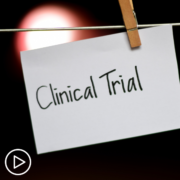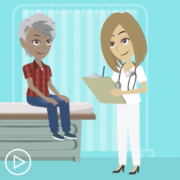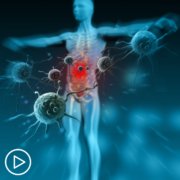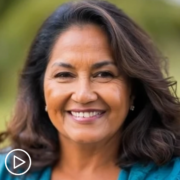What Do CLL Patients Need to Know About Clinical Trials?
What Do CLL Patients Need to Know About Clinical Trials? from Patient Empowerment Network on Vimeo.
What is a clinical trial and how does patient participation work? This animated video provides an overview of clinical trials, the process, and details key steps for engaging in your care.
See More from CLL Clinical Trials 201
Related Resources:

|

|

|
Transcript:
Dr. Singh:
Hi, I’m Dr. Singh, and this is my patient, Elena, who is living with chronic lymphocytic leukemia, also called “CLL.”
And Elena is participating in a CLL clinical trial.
Let me start by explaining what a clinical trial IS. Basically, it is a research study with human participants. And the goal of cancer clinical trials is to discover new and improved treatments to treat or to prevent cancer.
At first, when I asked Elena if she would consider participating, she had a few hesitations.
Elena:
Yes—even though I trust Dr. Singh, I still had questions.
So, the first thing I asked was, what steps are taken to protect my safety if I participate in a trial?
Dr. Singh:
This is a common concern for many patients, and so I explained to Elena that each trial has a strict safety protocol, with set guidelines to protect patients. Beyond that, researchers are required to follow patient safety rules, which are enforced by the U.S Food & Drug Administration (FDA). At each study location, an institutional review board (or IRB) regularly reviews a study, and many trials are overseen by a group called a data and safety monitoring committee.
And the trial team, which can include nurses and researchers, closely monitors the health of each trial participant regularly, all throughout the process. This is why clinical trials often require more visits and testing, and, in turn, a bigger commitment from that patient.
Elena:
After I felt more comfortable about the safety aspects, I asked Dr. Singh which clinical trial he would recommend for my CLL.
Dr. Singh:
That’s right. We discussed Elena’s available trial options, reviewed the pros and cons of each approach, as well as the logistics and potential financial impact.
And it’s important to note that not every patient will qualify for every trial. Clinical trials have “eligibility requirements,” which can vary widely but may include factors like a patient’s age, health, and any prior treatments they have had.
Elena:
And there are several phases of clinical trials, right, Dr. Singh?
Dr. Singh:
Yes, exactly. The main phases are Phase I, II, III and IV. Each phase gathers valuable information about the treatment and helps measure its effectiveness.
Elena:
So, the main reason I joined a trial was to find out if a newer treatment could be more effective than the standard of care to treat my CLL. AND I wanted to help move cancer research forward for the CLL community.
Dr. Singh:
Exactly. Not every patient has the same reason for participation, but trials are essential for developing new and improved treatments for the future.
Elena:
I also learned that patients can leave a trial at any time or stage if they wish.
Dr. Singh:
That’s a great point, Elena.
Now that you understand more about trials, how can you find out more?
- Start by asking your doctor if there are any trials that are available to you—and, if there is a specific trial that they recommend for you.
- If there is a trial that your team recommends, ask to discuss:
- The treatment approach used in the study and the purpose of the trial.
- The risks and benefits of participation.
- The financial costs, if any, and if there are assistance programs to help if you need it.
- The location of the trial and whether it can be coordinated with your local institution if it isn’t conveniently located—or, if transportation is available.
- How often you will need to go to the trial site and how long the trial will last.
- Finally, continue to educate yourself, using resources like clinicaltrials.gov.
Elena:
And visit powerfulpatients.org/CLL to learn more about clinical trials and CLL research.
Dr. Singh:
Thanks for joining us!










